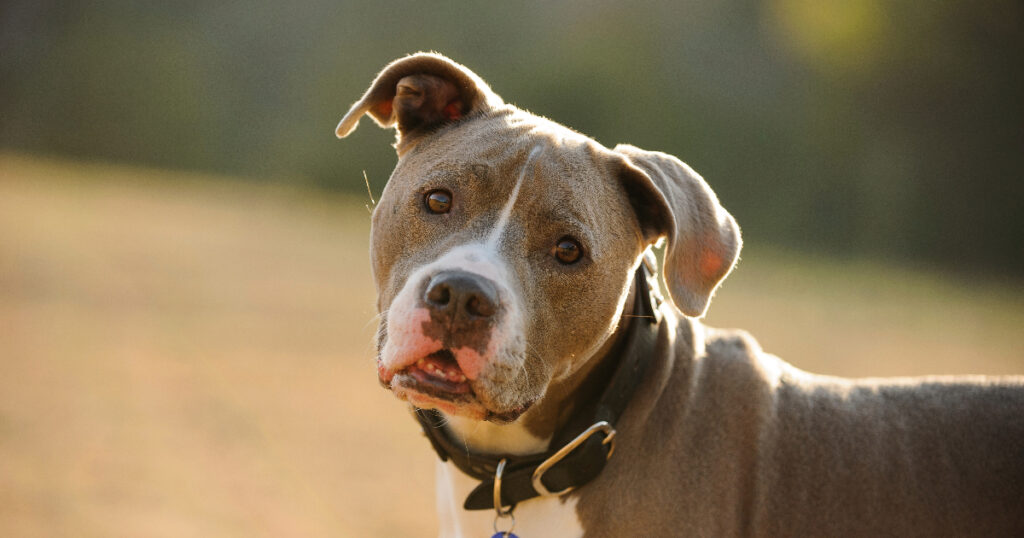Dog collars are commonly used tools to walk, train, and identify our furry companions. However, some dog owners have concerns that collars may potentially damage their dog’s trachea.
The trachea, also known as the windpipe, is a vital structure for breathing and any damage to it can have serious health consequences.
Let’s take an in-depth look at how dog collars can impact tracheal health.
Understanding Dog Tracheal Anatomy
To understand if and how dog collars might damage the trachea, it’s important to first understand the anatomy. The trachea is a tube-like structure made up of rings of cartilage that runs from the larynx down into the chest cavity, splitting into the two primary bronchi that go to the lungs.
This cartilage gives the trachea stability and keeps it open so air can pass freely to and from the lungs. In healthy dogs, the cartilage rings are firm but flexible. Tracheal collapse occurs when the cartilage weakens and the rings flatten, narrowing the inside diameter of the trachea. This obstruction can make breathing more difficult.
Toy breeds and small dogs are most prone to tracheal collapse, as their tracheas are smaller and more delicate. Middle-aged dogs are also at increased risk. Obesity, respiratory infections, and congenital cartilage abnormalities can also predispose dogs to tracheal collapse.
Can Collars and Leashes Cause Tracheal Collapse?

The question of whether collars and leashes can directly cause tracheal collapse has long been debated. Most experts believe tracheal collapse usually results from genetic predisposition coupled with environmental factors. However, it is possible that forceful pulling against a collar could damage and weaken tracheal cartilage over time.
Choke chains and slip collars may pose the highest risk, as they tighten significantly when the dog pulls. Even flat collars apply focused pressure on a small area of the neck when tightened. The risks go up if there is a constant tug-of-war against resistance on the leash. Leash corrections or jerks can also strain the trachea.
For predisposed dogs, this strain on the trachea from pulling against a collar could contribute to progressive collapse. Using a body harness instead is recommended for dogs prone to pulling and tracheal issues, as it avoids pressure on the neck.
Signs of Tracheal Collapse
Watch for these common signs of tracheal damage:
- Dry, harsh cough similar to a goose honk
- Coughing when excited or pulling against the leash
- Difficulty breathing
- Blue gums
- Fainting
- Collapsing trachea is notoriously difficult to diagnose, so persistent respiratory signs warrant a veterinary exam.
Steps to Reduce Trachea Damage Risk
While collars do not directly cause tracheal collapse in otherwise healthy dogs, it’s smart to minimize risks, especially in predisposed breeds. Here are some tips:
- Use a harness instead of a neck collar. Harnesses disperse pressure over the chest rather than the trachea.
- Choose wide, well-padded, and flexible collar materials. Nylon or leather is gentler than metal chains.
- Properly fit the collar high on the neck near the base of the skull. Leave room for two fingers between the collar and skin.
- Train your dog not to pull on the leash. Reward and reinforce loose leash walking. Stop immediately if they pull.
- Consider a head halter if they persistently pull. These turn the head when they pull.
- Use a double-clip leash that attaches to both the collar and harness. The collar identifies harness controls.
- Consider surgery if your dog has severe, progressive tracheal collapse. Surgery may reinforce the cartilage rings.
Additional Risks of Collars
While tracheal damage is the main concern with collars, it’s not the only one. Collars can also potentially damage the following:
- Spine and back – Pulling and jerking can misalign delicate vertebrae.
- Throat – Larynx and pharynx irritation or bruising if the collar is too tight.
- Eyes – Pressure behind the eyes and on blood flow to the ocular area.
- Skin – Direct irritation, friction burns, and hair loss from tight collars.
- Use collars cautiously and avoid undue pressure on the neck to keep your dog safe and comfortable. Thoroughly train your dog not to pull. A properly fitted body harness is an excellent alternative for avoiding trachea and spine issues. And take action quickly at the first signs of respiratory distress.
FAQ
Can a martingale collar cause tracheal damage?
Martingale collars can still pose a risk of tracheal damage if the dog pulls, as they tighten somewhat around the neck. They distribute pressure more evenly than choke collars but still apply focused force on the trachea when tightened. Using a martingale collar only under supervision and training the dog not to pull can reduce the risks.
Should puppies wear a collar?
Most experts recommend waiting until a puppy is at least 8 weeks old before using a collar. Puppy tracheas are extremely delicate. A lightweight, properly fitted collar is safest when necessary, along with constant supervision to avoid excessive pulling. Harnesses are ideal for very young puppies.
When should I be concerned about tracheal damage?
See your veterinarian promptly if your dog shows persistent respiratory signs like coughing, gagging, difficulty breathing, or fainting episodes. These signs warrant an exam to diagnose or rule out tracheal collapse. Early intervention is key to managing tracheal disease.
What are warning signs my dog’s collar is too tight?
Signs a collar is too tight include coughing or gagging when the collar is tugged, difficulty swallowing or eating, raspy breathing sounds, redness or sores on the skin under the collar, and inability to comfortably insert two fingers between the collar and the dog’s neck. Loosen the collar if any of these are noticed.
Can a harness damage my dog’s trachea?
Quality harnesses that distribute pressure evenly over the chest and shoulders are unlikely to cause tracheal damage. Avoid harnesses that ride low on the neck. Proper harness fit is important to avoid strain elsewhere. Some rubbing or hair loss can occur initially when introducing a harness while the dog adjusts.
Conclusion
While collars do not directly cause tracheal collapse, they can potentially worsen tracheal damage and progression in predisposed dogs, especially when they pull persistently on a leash. Choke and slip collars apply focused pressure and have the highest risks. Using wide, padded collars properly fitted high on the neck can reduce the risks.
However, switching to a body harness avoids contact with the trachea entirely, and is highly recommended for dogs that pull consistently on a leash. With proper training and equipment choices, you can walk your dog safely without putting undue strain on the trachea or neck. Pay close attention to any signs of respiratory distress and see your veterinarian promptly if they emerge. With knowledge and care, you can keep your pup happy and healthy for many years to come.

